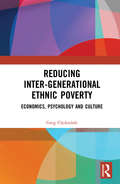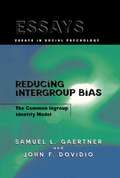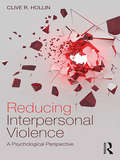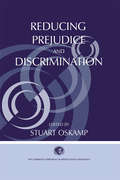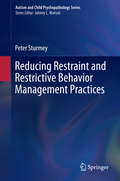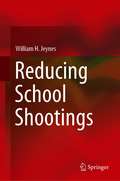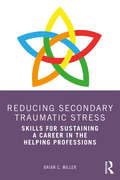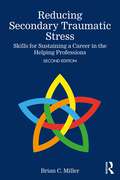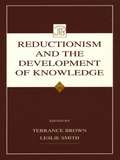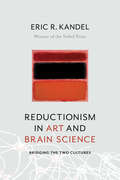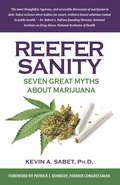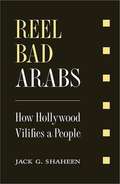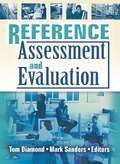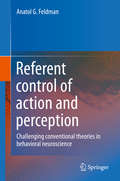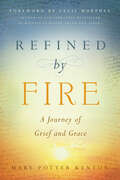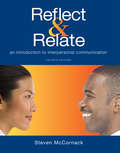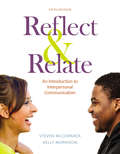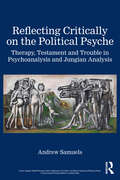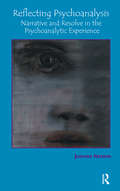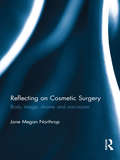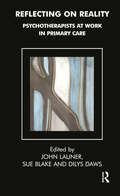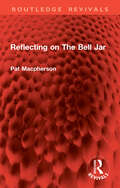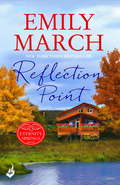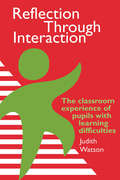- Table View
- List View
Reducing Inter-generational Ethnic Poverty: Economics, Psychology and Culture (Education, Poverty and International Development)
by Greg ClydesdaleThis book looks at human capital development and provides an explanation for why cognitive development varies among ethnic groups. The book uses an interdisciplinary approach to examine inter-generational ethnic poverty. It puts forth an argument that the ethnic poverty gap can be reduced, and to do so we need a broader view of human capital which considers the match between the nature of the economy and the specific capabilities needed. The book focuses on the interrelationship between developmental psychology and socio-economic status and argues that the most important relationship in a knowledge economy is actually the one between a parent and a child. The book begins by looking at cultures and assimilation and investigates the link between education, culture and socio-economic status. It also attempts to answer the question of what the link between culture, parents and children’s ability is and why ethnic groups vary in their nurturing. It delves into how parenting and cognitive development are interrelated. This thought-provoking book concludes with an emphasis on nurture and how it may alleviate ethnic poverty and shape social policies. The book provides a strong thesis to counter explanations based on racial and genetic superiority.
Reducing Intergroup Bias: The Common Ingroup Identity Model (Essays in Social Psychology)
by John F. Dovidio Samuel L. GaertnerConsiders situations and interventions that can foster more inclusive representation and ways, both theoretically and practically, and that a common ingroup identity can facilitate more harmonious intergroup relations.
Reducing Interpersonal Violence: A Psychological Perspective
by Clive HollinThere are many types of interpersonal violence that can lead to short- and long-term physical and psychological effects on those involved. Reducing Interpersonal Violence reflects on the World Health Organization’s stance that interpersonal violence is a public health problem and considers what steps can realistically be taken towards its reduction. Clive Hollin examines interpersonal violence across a range of settings, from bullying at school and in the workplace, smacking children and partner violence in the home, to sexual and other forms of criminal violence in the community. This book summarises the research on evidence-based strategies to reduce violence and shows that reducing interpersonal violence can have a positive effect on people’s wellbeing and may save a great deal of public expenditure. This book is an invaluable resource for students and researchers in the fields of psychology, criminology, law, and police studies, as well as professionals such as probation staff and forensic psychologists.
Reducing Prejudice and Discrimination (Claremont Symposium on Applied Social Psychology Series)
by Stuart OskampFinding ways to reduce prejudice and discrimination is the central issue in attacking racism in our society. Yet this book is almost unique among scientific volumes in its focus on that goal. This important book combines critical analysis of theories about how to reduce prejudice and discrimination with cutting-edge empirical research conducted in real-world settings, as well as in controlled laboratory situations. This book's outstanding contributors focus on a common set of questions about ways to reduce intergroup conflict, prejudice, and stereotyping. They summarize their own research, as well as others, interpret the conclusions, and suggest implications concerning the practical methods that have been, or could be, used in programs aimed at reducing intergroup conflict. The chapters present solidly based critical analyses and research findings in clear, reader-friendly prose. This book evolved from the Sixteenth Annual Claremont Symposium on Applied Social Psychology. Each Symposium in the series concentrates on a single area in which social psychological knowledge is being applied to the resolution of a current social problem. Ideal for teachers, social workers, administrators, managers, and other social practitioners who are concerned about prejudice and discrimination, this book will also serve as a valuable foundation of knowledge in courses that examine this topic.
Reducing Restraint and Restrictive Behavior Management Practices
by Peter SturmeyThis book presents an evidence-based framework for replacing harmful, restrictive behavior management practices with safe and effective alternatives. The first half summarizes the concept and history of restraint and seclusion in mental health applications used with impaired elders, children with intellectual disabilities, and psychiatric patients. Subsequent chapters provide robust data and make the case for behavior management interventions that are less restrictive without compromising the safety of the patients, staff, or others. This volume presents the necessary steps toward the gradual elimination of restraint-based strategies and advocates for practices based in client rights and ethical values. Topics featured in this volume include: The epidemiology of restraints in mental health practice. Ethical and legal aspects of restraint and seclusion. Current uses of restraint and seclusion. Applied behavior analysis with general characteristics and interventions. The evidence for organizational interventions. Other approaches to non-restrictive behavior management. Reducing Restraint and Restrictive Behavior Management Practices is a must-have resource for researchers, clinicians and practitioners, and graduate students in the fields of developmental psychology, behavioral therapy, social work, psychiatry, and geriatrics.
Reducing School Shootings
by William H. JeynesThis book calls for a multidimensional and comprehensive approach to reduce the number of school shootings, rather than the simplistic unidimensional strategy that is commonly advocated. Based on meta-analyses examining which variables are most often related to positive changes in violent student behavior, it also integrates other research and historical trends in order to formulate recommendations regarding how to reduce school shootings.The topic of school shootings is one of the most vital issues in society today, because: 1) schools should be the safest places on Earth for children, 2) if students do not feel safe, they are not going to learn very well in school, and 3) it is of such great concern to parents and society at large, as evinced by the degree of news coverage that school shooting incidents receive.Sadly, despite the gravity of the problem, many people tend to either respond in an emotional way or propose simplistic solutions. Gun control legislation alone will not solve the problem; instead, it calls for a multi-disciplinary and multifaceted approach, involving parents, teachers, schools and healthcare. This book investigates the status quo, goals, and solutions, pursuing a fact-based approach.This book is of special interest to the academic community, national leaders, and other policymakers. It is also suitable for courses on education, psychology, sociology, criminal justice and other areas of law. It will also appeal to the general audience.
Reducing Secondary Traumatic Stress: Skills for Sustaining a Career in the Helping Professions
by Brian C. MillerReducing Secondary Traumatic Stress presents a model for supporting emotional well-being in workers who are exposed to the effects of secondary trauma. The book provides helping professionals with a portfolio of skills that supports emotion regulation and recovery from secondary trauma exposure and also that enhances the experience of the helping encounter. Each chapter presents evidence-informed skills that allow readers to regulate distressing emotions and to foster increased empathy for those suffering from trauma. Reducing Secondary Traumatic Stress goes beyond the usual discussion of burnout to talk in specific terms about what we do about the very real stress that is produced by this work.
Reducing Secondary Traumatic Stress: Skills for Sustaining a Career in the Helping Professions
by Brian C. MillerThe second edition of Reducing Secondary Traumatic Stress expands the five evidence-informed CE-CERT practices for supporting emotional well-being in workers exposed to the effects of secondary trauma. Adding new insights, additional research support, and fresh examples, the conversational tone makes this edition eminently readable and especially useful.Not only does the book provide helping professionals with a portfolio of skills that support emotion regulation and recovery from secondary trauma exposure, it also enhances the experience of the helping encounter. Each chapter presents evidence-informed skills that allow readers to regulate distressing emotions and foster increased empathy for those suffering from trauma. Reducing Secondary Traumatic Stress goes beyond the usual discussion of burnout to talk in specific terms about what we do about the very real stress that is produced by this work.
Reductionism and the Development of Knowledge (Jean Piaget Symposia Series)
by Leslie Smith Terrance BrownAmong the many conceits of modern thought is the idea that philosophy, tainted as it is by subjective evaluation, is a shaky guide for human affairs. People, it is argued, are better off if they base their conduct either on know-how with its pragmatic criterion of truth (i.e., possibility) or on science with its universal criterion of rational necessity. Since Helmholtz, there has been increasing concern in the life sciences about the role of reductionism in the construction of knowledge. Is psychophysics really possible? Are biological phenomena just the deducible results of chemical phenomena? And if life can be reduced to molecular mechanisms only, where do these miraculous molecules come from, and how do they work? On a psychological level, people wonder whether psychological phenomena result simply from genetically hardwired structures in the brain or whether, even if not genetically determined, they can be identified with the biochemical processes of that organ. In sociology, identical questions arise. If physical or chemical reduction is not practicable, should we think in terms of other forms of reduction, say, the reduction of psychological to sociological phenomena or in terms of what Piaget has called the "reduction of the lower to the higher" (e.g., teleology)? All in all, then, reductionism in both naive and sophisticated forms permeates all of human thought and may, at least in certain cases, be necessary to it. If so, what exactly are those cases? The papers collected in this volume are all derived from the 29th Annual Symposium of the Jean Piaget Society. The intent of the volume is to examine the issue of reductionism on the theoretical level in several sciences, including biology, psychology, and sociology. A complementary intent is to examine it from the point of view of the practical effects of reductionistic doctrine on daily life.
Reductionism in Art and Brain Science: Bridging the Two Cultures
by Eric KandelAre art and science separated by an unbridgeable divide? Can they find common ground? In this new book, neuroscientist Eric R. Kandel, whose remarkable scientific career and deep interest in art give him a unique perspective, demonstrates how science can inform the way we experience a work of art and seek to understand its meaning. Kandel illustrates how reductionism—the distillation of larger scientific or aesthetic concepts into smaller, more tractable components—has been used by scientists and artists alike to pursue their respective truths. He draws on his Nobel Prize-winning work revealing the neurobiological underpinnings of learning and memory in sea slugs to shed light on the complex workings of the mental processes of higher animals. In Reductionism in Art and Brain Science, Kandel shows how this radically reductionist approach, applied to the most complex puzzle of our time—the brain—has been employed by modern artists who distill their subjective world into color, form, and light. Kandel demonstrates through bottom-up sensory and top-down cognitive functions how science can explore the complexities of human perception and help us to perceive, appreciate, and understand great works of art. At the heart of the book is an elegant elucidation of the contribution of reductionism to the evolution of modern art and its role in a monumental shift in artistic perspective. Reductionism steered the transition from figurative art to the first explorations of abstract art reflected in the works of Turner, Monet, Kandinsky, Schoenberg, and Mondrian. Kandel explains how, in the postwar era, Pollock, de Kooning, Rothko, Louis, Turrell, and Flavin used a reductionist approach to arrive at their abstract expressionism and how Katz, Warhol, Close, and Sandback built upon the advances of the New York School to reimagine figurative and minimal art. Featuring captivating drawings of the brain alongside full-color reproductions of modern art masterpieces, this book draws out the common concerns of science and art and how they illuminate each other.
Reefer Madness: Sex, Drugs, and Cheap Labor in the American Black Market
by Eric SchlosserEssays explore the social and economic effects on groups and individuals of our underground economy. The underground economy has subtle and surprising effects on the United States as.
Reefer Sanity: Seven Great Myths About Marijuana
by Kevin SabetIn this book, Kevin A. Sabet argues that the United States should not legalize pot with all of its attendant social costs, nor damage the future prospects of pot smokers by prosecuting and jailing them.
Reel Bad Arabs: How Hollywood Vilifies a People
by Jack G. ShaheenA groundbreaking book that dissects a slanderous history dating from cinema's earliest days to contemporary Hollywood blockbusters that feature machine-gun wielding and bomb-blowing "evil" Arabs.
Reference Assessment and Evaluation
by Mark Sanders Tom DiamondLearn effective ways to assess and evaluate reference services in YOUR libraryInnovation and the constant evolution of technology continually spur academic librarians to find superior ways to deliver high quality reference service to students, faculty, and researchers. Reference Assessment and Evaluation offers librarians and administrators a plethora of fresh ideas and methods to effectively assess and evaluate reference service in any academic library. Leading experts share their own best practices in delivering digital reference, training staff and student workers, and providing instruction through case studies from academic libraries of all sizes. Because of fiscal pressures, the need to attract the best and brightest students and faculty to the academy, and increased competition from Internet search engines, the evaluation and assessment of reference service remains one of the most important challenges for academic libraries. Reference Assessment and Evaluation provides practical tips and clear examples on assessing and evaluating several diverse aspects of reference services. This book discusses in detail case studies from various colleges and universities on wide-ranging issues such as virtual reference evaluation, merging reference desks, peer evaluations, library instruction, and staff development. Academic libraries of all types will find opportunities to modify these innovative ideas to remain at the forefront of reference service.Topics in Reference Assessment and Evaluation include: a case study of the library at the University of Colorado at Boulder&’s efforts to implement a drop-in research consultation program for students enrolled in the introductory writing course coordination of an annual professional development program for specialized instruction targeted at faculty and staff members at Colorado State University peer observation between the reference staff members of Augustana College Library and St. Ambrose University Library the merging of San Jose State University&’s government publication desk with the reference services desk-along with the public library&’s reference desk Valparaiso University&’s main library&’s training and use of student assistants analyzing user and librarian satisfaction within virtual reference transactions evaluation of the University of South Alabama&’s Baugh Biomedical Library&’s chat reference service evaluation of the University of Texas at Arlington&’s virtual reference service library technology&’s impact on reference desk statistics statistical analysis of reference desk data for staffing needs at the University of Tennessee at ChattanoogaReference Assessment and Evaluation is timely, important reading for academic references librarians and supervisors.
Referent control of action and perception
by Anatol G. FeldmanEmpirical data on neural control of motor action and perception have not yet been put into the context of a coherent theory. Dr. Feldman's goal for the proposed book is to illustrate that the field is now at a stage where the data can be used to formulate some core principles that underlie action and perception and to present the foundation of a scientific theory of motor control. Dr. Feldman is a well-known expert and has been active in the field for a long time. In the proposed book he will outline an approach to the analysis of action and perception that he and his colleagues have been using for the past 50 years or so. His theoretical approach will not only help to explain past empirical research, but should also help to inform and provide a structure for future empirical studies.
Refined by Fire: A Journey of Grief and Grace
by Mary Potter Kenyon"Where is the handbook for widows?" Mary Kenyon lamented as she planned a funeral for the beloved husband whose triumph over cancer she chronicled in Chemo-Therapist: How Cancer Cured a Marriage. During the ensuing weeks, as she attempted to make sense of his untimely death, she filled two journals, blogged, and read the inspirational writings of others who had gone down the road of grief before her--authors like C.S. Lewis and Madeleine L'Engle. She eventually found herself studying grief and bereavement in her quest to unearth answers to alleviating the pain associated with profound loss. In the process, she discovered a strength and emotional reserve she didn't know she had, along with an evolving faith that helped her face the impending loss of an eight-year-old grandson. "In the midst of the darkness of loss, I found light. Admittedly, in those first weeks, it might have been but a single small spark I sensed deep inside of me, but that spark guided me in the twisted, dark journey of grief. As I stumbled over the roots of hopelessness and despair, that light grew to illuminate my path, a path I sometimes felt very alone on. At some point in the journey I'd turned around, and there was God. "That is grace." In beautiful prose, touching metaphors and stories, and actual journal entries, Mary Potter Kenyon provides a balm for the grieving soul.
Reflect & Relate
by Steven MccornackIn Reflect & Relate, distinguished teacher and scholar Steve McCornack provides students with the best theory and most up-to-date research and then helps them relate that knowledge to their own experiences. Engaging examples and a lively voice hook students into the research, while the book's features all encourage students to critically reflect on their own experiences. Based on years of classroom experience and the feedback of instructors and students alike, every element in Reflect & Relate has been carefully constructed to give students the practical skill to work through life's many challenges using better interpersonal communication. The new edition is thoroughly revised with a new chapter on Culture; new, high-interest examples throughout; and up-to-the-moment treatment of mediated communication, covering everything from Internet dating to social media. Reflect & Relate, Fourth Edition has its own dedicated version of Bedford/St. Martin's LaunchPad, which brings together all of the book's student and instructor media, making this a truly integrated print/interactive resource.
Reflect & Relate: An Introduction To Interpersonal Communication
by Steven McCornack Kelly MorrisonIn Reflect & Relate, distinguished teacher and scholar Steve McCornack provides students with the best theory and most up-to-date research and then helps them relate that knowledge to their own experiences. Engaging examples and a lively voice hook students into the research, while the book's features all encourage students to critically reflect on their own experiences. Based on years of classroom experience and the feedback of instructors and students alike, every element in Reflect & Relate has been carefully constructed to give students the practical skill to work through life’s many challenges using better interpersonal communication. The new edition is thoroughly revised with a new chapter on Culture; new, high-interest examples throughout; and up-to-the-moment treatment of mediated communication, covering everything from Internet dating to social media.
Reflecting Critically on the Political Psyche: Therapy, Testament and Trouble in Psychoanalysis and Jungian Analysis
by Andrew SamuelsWith passion and originality, within this new book, Samuels presents powerful material on culture and politics (including a critical take on political violence) and a compassionate account of the role of an individual when it comes to progressive politics.Initial chapters include his commentary on Edward Albee’s shocking play The Goat and a provocative and critical view on liberal idealisation of ‘the Other’. Then, there is more of Samuels’ celebrated work bringing therapy thinking to bear on politics, and as far as the practice and organisation of therapy is concerned, readers will find new work on how to organise a good training (you must use pluralism) and a robust account of what a critical psychotherapy might look like. A section on Jungian matters includes Samuels’ work on Jung and ‘Africans’, whose importance has long been recognised, and a scintillating ‘balance sheet’ for Jungian analysis, setting its strengths and weaknesses alongside each other. In a clinical section, Samuels shows us what he means by the dynamic idea of the ‘activist client’.With each chapter being preceded by a special ‘retrospective introduction’, as well as including experiential exercises to ground the ideas, this unique collection of papers will be of interest to psychotherapists, Jungian analysts, psychoanalysts, and counsellors, as well as academics working in those fields.
Reflecting Psychoanalysis: Narrative and Resolve in the Psychoanalytic Experience
by Jurgen ReederAt the heart of this book is an ethical question: 'With what legitimacy do I assume the right to interpret my fellow being?' This question is raised in the context of a critique of a particular hermeneutic interpretation of psychoanalysis, namely, psychoanalysis as an objectifying discipline in which the other (the analysand) is regarded quintessentially as a representation or exterior object to be understood. The author embraces the fundamental intersubjectivity of psychoanalytic experience. Intersubjectivity is viewed as the human encounter within the psychoanalytic setting where there occurs a mutual influencing or acting upon, rather than an encounter guided by an essentially objectivating scientific knowledge. Truth in this conception is not a cumulatively acquired possession, but an always-emerging process coiled within an interpretative dialectic occurring between human beings. This is a thoughtful, nuanced, clearly articulated and challenging book that engages directly with the perceived crisis of psychoanalysis.
Reflecting on Cosmetic Surgery: Body image, Shame and Narcissism
by Jane Megan NorthropCosmetic surgery represents an extreme form of modern grooming. It is the fastest growing medical specialty, yet misconceptions abound about those who undertake it and their reasons for doing so. With a grounded approach, engaging 30 women through in-depth interview, this study explores how they chose cosmetic surgery as an option. Their accounts frame a theoretical discussion, in which Northrop proposes that cosmetic surgery is initiated within the vulnerable and divisive relationship between the self and its poor body image. Poor body image and the attempt at its reparation are examined conceptually through shame and narcissism. With compelling case studies and a multi-disciplinary approach, Reflecting on Cosmetic Surgery demonstrates that shame constitutes a framework through which we formulate appearance norms and learn the art of becoming socially embodied. Shame concerns the self, but manifests in response to perceived social phenomena. Through the evaluation and amendment of body image with cosmetic surgery, notions of self and social worthiness are played out. Northrop argues convincingly for a review of the way in which we view narcissism and proposes that shame, and the discomforts arising from it, are implicated in its occurrence. This book will appeal to students and scholars across the social sciences, and particularly in women’s studies and gender studies.
Reflecting on Reality: Psychotherapists at Work in Primary Care (Tavistock Clinic Series)
by John Launer Dilys Daws Sue BlakePrimary care and psychotherapy are in some ways worlds apart. Yet both deal with the same human fundamentals: birth, and death, hope and disappointment, identity and uncertainty. This innovative book looks at how psychotherapists can make use of their skills in primary care. It examines how therapists, family physicians and other primary care professionals can all learn from each other through clinical collaboration. Each chapter describes a different practical approach to joint working in a range of primary care settings, across the life cycle. Specific topics include services for children and adolescents, working with immigrants, and live supervision. All the authors are connected with the Tavistock Clinic, and are psychotherapists or family physicians. The book challenges psychotherapists and those who work in primary care to develop closer working relationships, so that they can deliver more effective and more equitable services.
Reflecting on The Bell Jar (Routledge Revivals)
by Pat MacphersonIn the 1950s, America was in the grip of Cold War paranoia and McCarthyism. Communism and ‘gender maladjustment’ were twin threats to the social ideals of family and security. Yet, previous readings of Plath and her heroine have ignored much of the social context of this era.Reflecting on The Bell Jar (first published in 1991) acknowledges this repressive post-war regime of social hygiene. Pat Macpherson’s reading takes into account the fundamental rearrangement of the social contract between citizen and state, built on the newly made connections between national security and mental health. She investigates the trial of the Rosenbergs and its connections with the electrotherapy Plath and her heroine both experience. Macpherson also evaluates the coercive effects of society’s self-imposed inquisitional attitude of surveillance and explores its role in forming female identity. Esther Greenwood, says Macpherson, is the first heroine of our own era of popularized therapeutic culture.As challenging and thought provoking as the novel itself, this book provides a new approach to one of feminism’s most difficult heroines. It will be a fascinating read for students of women’s studies, literature, and cultural studies, and for all those intrigued by the writings of Slyvia Plath.
Reflection Point: A heartwarming, uplifting, feel-good romance series (Eternity Springs)
by Emily MarchIf you love Robyn Carr's Virgin River, don't miss Emily March's warm, uplifting Eternity Springs series!Reflection Point is the captivating sixth novel in New York Times bestselling author Emily March's warm and uplifting romance series about a small town with a big heart. For fans of Debbie Macomber, Holly Martin and Sheryl Woods.Savannah Moore arrives in Eternity Springs, determined to leave her troubled past behind. Her handcrafted-soap shop fits perfectly with the magic of this warm and welcoming community - only the sexy, suspicious local sheriff promises to upset her happiness.Zach Turner knows this woman means trouble: maybe to his town, possibly to his friends, but definitely to his heart. The simmering Southern beauty drives the committed bachelor crazy, taunting him with possibilities beyond his dedication to his sometimes dangerous job. So when Savannah's dark past follows her to town, wreaking havoc with their lives, Zach will fight for all he's worth, for a love he can't afford to lose.Escape to Eternity Springs, a little piece of heaven in the Colorado Rockies, with the other books in the series, Hummingbird Lake, Heartache Falls, Mistletoe Mine, Lover's Leap, Nightingale Way, Reflection Point, Miracle Road, Dreamweaver Trail, Teardrop Lane, Heartsong Cottage, Reunion Pass, Christmas In Eternity Springs.
Reflection Through Interaction: The Classroom Experience Of Pupils With Learning Difficulties
by Judith Watson Moray House Institute of EducationFirst Published in 1996. Teaching approaches for pupils with learning difficulties have often emphasized the presentation and repetition of easily manageable tasks rather than exploration, learning through mistakes and reflection. However, there is encouraging evidence that such pupils may be helped to develop effective learning approaches with marked improvements in their academic performance and self-concept. The importance of the teacher's role in facilitating pupils' reflective activity cannot be overstated. This book locates reflective experiences within classroom interaction and discusses a variety of ways in which teachers can foster reflection. These include their classroom talk, challenging activities, and the creation of an ethos where expectations are high and pupils' thinking and self-awareness are shown to be valued. Most, but not all, of the classroom research reported here was conducted in special schools for pupils with moderate learning difficulties, but the findings have implications for teachers of a wide range of pupils, in both ‘special' and ‘ordinary' schools. The hope is that they will be stimulated to incorporate some of the ideas in this book into their own practice.
